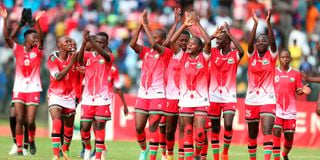Premium
Journalists must offer factual critique, not spread rumours

Junior Starlets players after their victory over Burundi in a Fifa U-17 Women World Cup qualifiers on June 16, 2024 at Ulinzi Sports Complex.
What you need to know:
- In her article, Cellestine Olilo sought to paint a grim picture of the welfare of the national U-17 women’s football team.
- She claimed that Junior Starlets players injured in camp or during qualification matches have been abandoned.
One rule of thumb reporters follow when researching a story is that no single source can provide all the information they might need.
Journalism is both a profession and a craft, drawing on specialised skills and adhering to common standards. Journalists have a responsibility to provide information that is accurate, fairly reported, and independent.
Unfortunately, this standard practice is sometimes abandoned, even by well-respected journalists working in reputable media organisations.
In an article authored by Cellestine Olilo and published in the Daily Nation on July 5, 2024, headlined Speak and be Damned: All is Not Well with Our Gallant Junior Starlets, the journalist sought to paint a grim picture of the welfare of the national Under-17 women’s football team, the Junior Starlets.
The Under-17 women's team made history as the first Kenyan team to qualify for a Fifa World Cup. The article claimed that Junior Starlets players who got injured while in camp or during qualification matches have been abandoned without proper medical care. This allegation is neither true nor fairly reported.
The report lacked attribution to any source, and the writer did not mention any players who were allegedly neglected or denied medical attention and allowances from the Sports Ministry.
Firstly, allowances for junior players are disbursed to their parents or guardians. This standard practice is well-known and should not escape the knowledge of an experienced sports journalist.
Genuine and constructive criticism
Alleging a plan to block injured players from receiving their rewards is mere speculation, pointing to malice in the article's creation.
Journalists must write independently, free from bias, and with the utmost integrity, not based on speculation. The Ministry of Sports has been clear about handling allowances. Questions arise from the article's baseless claims.
Olilo should develop a habit of verifying information from credible sources. If she did, she would have gotten a few things right. She must use her platform to write factual reports, offer genuine and constructive criticism, and not spread biased, unsubstantiated gossip.
Since the current Football Kenya Federation (FKF) leadership took office in 2016, structures to develop youth and women’s football were established, leading to today's successes.
The senior women’s team qualified for Kenya’s maiden African Women Cup of Nations in 2016 and almost qualified again before Kenya faced a FIFA suspension.
The Under-17 girls have thrived thanks to partnerships between FKF, school games associations, the Ministry of Sports, and initiatives like Safaricom Chapa Dimba and Talanta Hela sports development.
More women now play professional football abroad, thanks to the Federation’s continuous efforts. Player allowances and travel logistics have been catered for by the government, making the attack on FKF baseless and malicious.
Professionalising national team preparations was a game changer. FKF ensures national teams are managed by competent staff, players enjoy comfortable camps, and their allowances and travel logistics are covered. Kenya is a leader in implementing Fifa's Women Football campaign program.
Promoting women’s football
FKF's policy mandates women, especially former players and school sports teachers, in every coaching class, leading to a rise in professional women football coaches. Teacher trainers interact with young players, imparting knowledge at a tender age.
For the first time, Kenya boasts CAF A women coaches. Beldine Odemba, a CAF A holder, now coaches the senior Harambee Starlets and Police Bullets, winners of the FKF Women Premier League. Jackline Juma, also a CAF A coach, manages the Under-15 national team, Talanta Hela team, and Gor Mahia Queens, while Mildred Cheche and Ann Aluoch, both CAF B license holders, coached the Junior Starlets to a FIFA World Cup competition.
Juma, Cheche, and Aluoch, former national team players, have transitioned to successful coaches. Jackline and Beldine are CAF instructors, recently conducting courses abroad, empowered by their CAF A and instructor courses.
FKF's efforts in promoting women’s football are evident. The federation supports the women’s football campaign, distributing balls and promoting the game in areas like Turkana, Lamu, and Samburu.
FKF runs capacity-building programs for women, including training for media officers, physios, and other personnel working with women’s teams.
Club licensing for FKF Women Premier League clubs ensures professional management. Kenya’s first professional woman player, Doreen Nabwire, now heads FKF's leagues and competitions department, a testament to women’s empowerment.
The federation has made deliberate efforts to spread women’s football across various domains. Kenya’s strides in women’s football are commendable and should be accurately reported and celebrated.
Kenn Okaka is the Media and Communication Manager at the Football Kenya Federation




